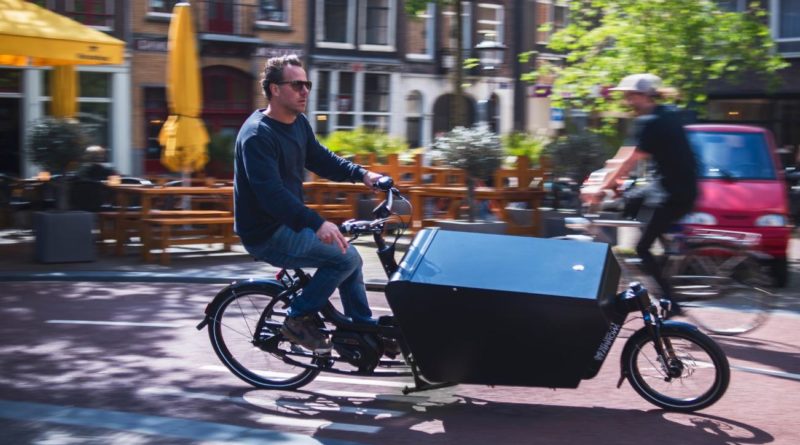ECF urges European cities to tap into ‘enormous potential’ of cargo bikes
The European Cyclists’ Federation (ECF) held a webinar today discussing the EU-funded City Changer Cargo Bike Project, which hopes to help cities realise the ‘enormous potential’ of cargo bikes for both transport and logistics.
The project aims to facilitate a faster and larger-scale uptake of cargo bikes in urban sectors, estimating a third of delivery trips in cities could be replaced by this form of transport.
Morten Kabell, ECF joint CEO, explained: “I can say from experience that for mayors, promoting these initiatives are cost-effective, low risk and rewarding. The inherent ease and affordability of cargo bikes makes them an increasingly popular choice for families, SMEs, non-profit organisations, and international logistics companies across Europe.
“There are many ways in which traffic has redefined human spaces, and cargo bikes can also contribute to fostering a more dynamic street life and community by engaging citizens.”
According to Kabell, cities can facilitate greater uptake of cargo bikes through various methods such as regulation, taxation and subsidy, information, and procurement.
“Mayors and council members have the ability to spread ideas in different ways and play an influential role in promoting cargo bikes,” he continued. “After taking the courage to invest in cargo bikes, cities can see growth across several sectors like food, retail, logistics, community, family and the public sector, which will all thrive as a result of realising the potential of cargo bikes.”
Kabell advised decision-makers that, in order to see an uptake of cargo bike use, they needed to favour cycle logistics in the procurement procedures of their municipalities, and to make cycle delivery the first choice for their city. When tendering for logistics, cities should include cycle delivery as the preferred option.
“Any city needs to take note of this,” Kabell said. “An excuse so far is that cargo bikes can be expensive. When you take the cost of a cargo bike and relate it to the cost of a car, then a city could buy between four to 20 times the amount of cargo bikes than they could cars. It is a question more of convenience and what we are used to doing.
“There is also the conversation of infrastructure. If you have a good, wide bike track then it should fit a cargo bike with room for bikes to overtake them, which is about prioritising your urban space. There is also a parking issue. We know that theft can be a problem so getting some dedicated parking infrastructure for cargo bikes is important, as is charging infrastructure for e-Bikes and e-Cargo bikes.”
Kabell was joined during the webinar by Holger Haubold, the ECF’s Director of Intellectual Property and Data Collection, to outline some of the fiscal incentives and subsidy schemes for the purchase of cargo bikes which have already been used in some cities throughout Europe.
Haubold discussed the success of subsidy schemes in Austria, which is ranked the 3rd highest country in the EU for per capita e-Bike sales, despite only average general cycling levels. There have been subsidies for companies and associations to purchase cargo bikes for several years, and since 2019 complementary regional and local schemes for individuals, through Austria’s more balanced e-Mobility policy.
Meanwhile, in France there have been different regional and local schemes, one of the most notable in Paris which provides a subsidy of 600 euros for the purchase of a cargo bike. In the wake of the Covid-19 recovery, there is hope that a new national subsidy scheme for e-Bikes and cargo bikes will be introduced.
Germany has also recently introduced a national subsidy scheme for the purchase of heavy-duty cargo bikes for companies and associations, in addition to implementing a large number of regional and local schemes for e-Bike take-up.
Haubold also held up London’s congestion charge, ULEZ and LEZ as examples of how taxation can shift transport away from cars towards public transport, cycling and other forms of active travel. Over the last 14 years, the £1.7 billion net revenue has been generated and re-invested in the capital’s transport infrastructure. In a cost breakdown according to Haubold, only 5% of this will go towards improving cycling provision, with 80% allocated to public transport.
Haubold said: “Cities should develop their own criteria and guidelines for procurement. By using their purchasing power to choose environmentally friendly goods, services and work, public authorities can make an important contribution to consumption and production.
“This is a very important issue. As we see more and more delivery vehicles on the streets today, public authorities can implement more space-saving, money-saving and eco-friendly modes of delivery within cities. Subsidy schemes for cargo bikes are far more cost-effective than subsidy schemes for electric cars in terms of using space, noise, air pollution and parking spaces. There’s a huge potential here, particularly during the EU’s recovery from Covid-19.“
More information on the EU’s City Changer Project can be found here.



